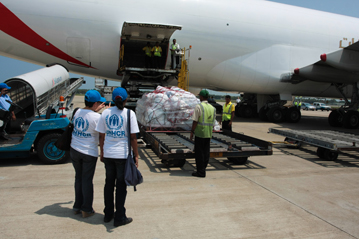Syria to admit nearly 200 Palestinians stranded on the Iraq-Jordan border
Syria to admit nearly 200 Palestinians stranded on the Iraq-Jordan border

GENEVA, April 25 (UNHCR) - The UN refugee agency has welcomed an announcement by the government of Syria to admit 181 Palestinians who fled Baghdad in terror following death threats in mid-March. Since that time they have been stranded on the Iraq-Jordan border, surviving in a makeshift camp, with supplies of food, water and other relief items provided by UNHCR and non-governmental organizations.
"We have been trying to find various solutions for these Palestinians and are now very grateful that the Syrian government is offering a solution to this group," said Radhouane Nouicer, UNHCR's regional deputy director in Geneva.
The group will be accepted into Syria under the auspices of the UN Relief and Works Agency (UNRWA), the organization set up to help Palestinians in the Near East. "We are in close contact with UNRWA which is responsible for Palestinians in Syria, and we are ready to offer assistance where needed."
There are an estimated 34,000 Palestinians in Iraq, of whom 23,000 are registered with UNHCR in Baghdad. Palestinian refugees came to Iraq in three main waves - in 1948, in 1967 and in 1991. Under Saddam Hussein's regime, they were provided with protection and assistance and enjoyed a relatively high standard of treatment that some segments of the Iraqi population now consider unfair.
Having faced death threats, intimidation and kidnapping in recent months, an initial group of 89 Palestinians arrived at the border on 19 March to find access into Jordan denied. The group, which was later joined by 93 more people, has camped at the Trebil border crossing ever since.
"We are presently in touch with all concerned parties trying to support a smooth and quick transfer of the group of 181 to Syria," said Nouicer.
News of the announcement from Syria has led to more Palestinians fleeing Baghdad to the border in the hope that they too will be allowed entry. "But," Nouicer added, "So far we have not been informed that additional groups of Palestinians will be accepted into the country."
Late on Saturday night, a bus carrying 50 Palestinians arrived at the Iraq-Jordan border. Iraqi border authorities did not initially allow them to join the group of 181 already camped there. When the weather worsened, however, the 34 women and children on the bus were allowed to temporarily shelter in the makeshift camp, while the men were moved to a site further away but still in the border area.
"Over the past two days, our staff in Jordan and Iraq have made every effort to allow the new arrivals to officially join the other group, but have been unsuccessful so far," UNHCR spokesman William Spindler told journalists at a regular briefing in Geneva. "We have been told by border officials that they had not received any official information regarding the admission of additional people into Syria.
"The situation inside the Trebil border camp is getting more and more difficult," Spindler continued. "Over the weekend, strong winds and dust storms blew away several tents and temporary infrastructure, such as latrines, and caused heavy damage to the camp."
Spindler added that UNHCR was continuing to work with the UN Assistance Mission for Iraq (UNAMI) and the Iraqi authorities to improve the security situation and enhance the protection of the Palestinians in the capital.









